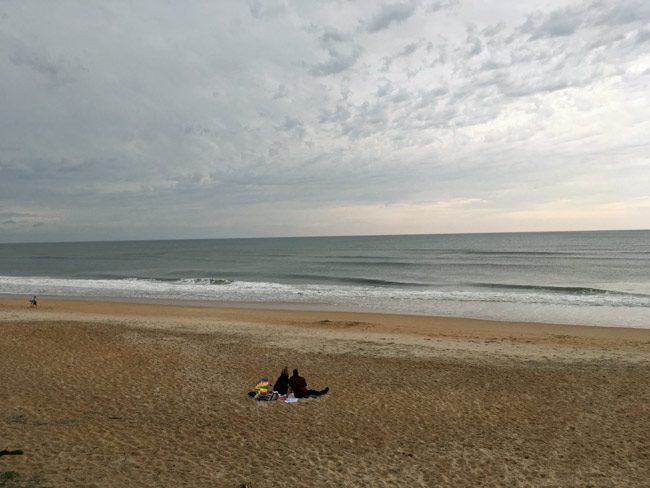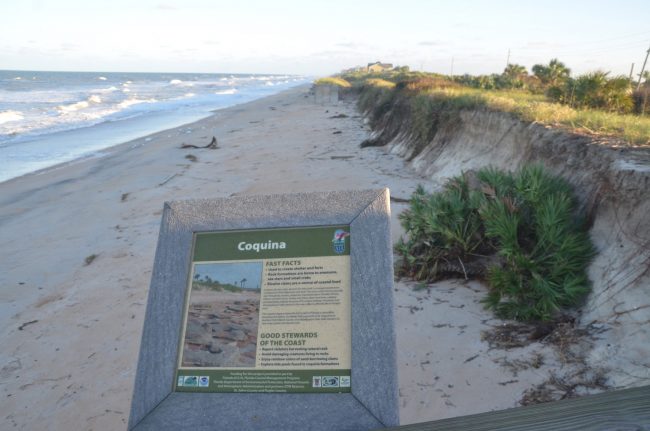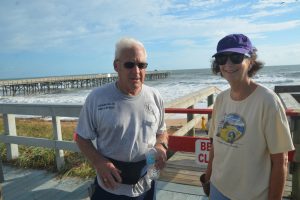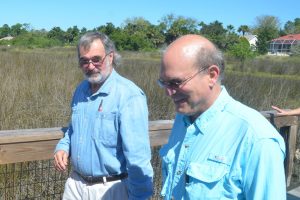
Old angers die hard, especially when incited by new ones. Just listen to Susan Colley talk about any possibility that private property owners would fence off their part of beach .
“I’ve only lived in Flagler County for 50 years,” Colley said. “I’m not a smooth talker, I’m very abrasive. But, the fatcats don’t want to see the hoi polloi cluttering up their private beach, and I’m sorry but that’s just wrong. They made us quit driving on the beach. I’ve never run over a turtle. I live like the Beverly Hillbillies, with my lawn chairs and my umbrellas and my coolers, have a ball. Never hurt a thing. But, that’s gone, never coming back. Now they’re trying to keep us from the beach and I predicted this. I don’t know if Mr. Hadeed remembers when the driving stopped, I predicted that the public would be confined to a hundred yards north and south of the pier, and it’s coming true. Maybe in my lifetime. And it’s wrong.”
The fencing off of beaches north and south of the Flagler Beach Pier isn’t about to happen, but a new state law does give private property owners whose land fronts the beach a new avenue to close off their portion of sands, even those sands that have customarily been used by the public for decades and more. The new law would force local governments that want to preserve that customary use to take the property owner to court and make their case there. Alternately, local governments have until July 1 to assert that customary use in an ordinance, which would then reverse the burden: the property owner would have to take the government to court and dispute the ordinance if fencing-off is disallowed.
So for the past two weeks the Flagler County Commission has been working toward just such a customary-use ordinance, with two of three public hearings already completed, and a third and final hearing scheduled for June 18. The commission’s new ordinance is expected to be approved then.

So Hadeed organized the hearings with Flagler Beach attorney Dennis Bayer in such a way as to include a series of sworn testimonies from long-time beach users, like Colley and many others, whose memories and current use of the beaches provide first-hand accounts of what it’s meant to have truly public beaches.
It’s all being done faster than the county hoped, because legislators themselves passed the new law with little discussion in the ending days of the last legislative session, giving governments little time to react. For Flagler, the potential legal problems are amplified by the fact that the county is in the midst of a massive, $25 million dune-rebuilding project to repair the severe erosion wrought by hurricanes Matthew and Irma, with much of those rebuilding sands being dumped on private property.
“What we are doing is unprecedented to save our beaches, because of the unique situation we’re in,” Hadeed told commissioners. “What is also unprecedented is the extent to which we have to rely on our own dollar resources to perform this project as opposed to having an overwhelming subsidy from the state and federal government, which is what typically happens. We’re ponying up, if you will, with more resources than other communities facing this issue, and plus, we’re doing it from county line to county line.”
The proposed customary-use ordinance would ensure that the public may still use not just the “wet sands” area of the beach, below the mean but ever-shifting high-tide line, which is protected for public use regardless, but also the “dry sands” areas above that line, and to the foot of dunes, which is private property, depending on whether private homes or businesses front that portion of beach. The proposed ordinance would also ensure that the public dollar spent on dune repairs are not questioned or put in question because the underlying land is owned privately.

At Monday’s hearing, he provided maps to commissioners going back to the early part of the 20th century and earlier.
“How fortunate we are to have so many people inside or outside of Flagler County that have made themselves so available to assist us,” Hadeed said, referring to the more than dozen people who’d then testify before the commission, among them old colleagues and friends: ex-Commissioner Barbara Revels, Anne Wilson, who’s served on innumerable county advisory committees with an interest in environmental protection, Steve Emmett, the mayor of Beverly Beach, and Carl Laundrie, for a quarter century a reporter and Flagler Bureau Chief for the News-Journal, later the county’s chief spokesman and recently one of its centennial’s organizers.
Dave Sullivan, a county commissioner, said he’d heard the argument that the new law changed nothing regarding public access to beaches—an argument Flagler’s Paul Renner, the House member, reiterated to an audience at the Palm Coast Community Center last month. “Well, if the law didn’t change anything, why did they pass the law?” Sullivan asked: the commission’s support for the proposed ordinance is unanimous, but that does not negate the importance of getting testimonies on the record as a preemptive way to show broad and long-standing public uses of the beaches even in the dry sands areas.
Revels established the template of those testimonies when she spoke two weeks ago. She spoke of her 63 years in the Flagler County area and of her family’s presence going back to her great-great grandparents.

Bayer asked her if she’d see others doing likewise. “Yes,” Revels said, “many people carried out the same pursuits as well as other visitors from other areas.” For a time Revels was a waitress at the Pier restaurant—“that’s how I got to have different pairs of shoes in high school”—and during that time she’d encounter big groups of beach travelers from out of the county who’d frequently drive their dune buggies in a caravan from Jacksonville to Flagler Beach, and have lunch at the restaurant.
In those 63 years, she said she never saw fences, no-trespassing signs and the like. Not on the beach. Nor was she ever shooed off a beach. But she also remembered a much wider beach, which has now “disappeared” because of erosion, which makes the dry-sands area even more of a playground.
Emmett, the mayor of Beverly Beach, provided another memorable testimony.
“Beverly Beach is the only town probably in the state of Florida that sits directly on the beach,”
he said. “I can throw a stone from my back office and hit the water. Right next to us is a campground, about 137 sites. Every other weekend we pick up about 200 extra people in the town. Every morning, I go out and I sit on our handicap ramp that we built not too long ago, and watch the people from the campground, watch the people from the residences that live across the street in 200-and-some homes over there, walk that beach south, and heading toward Flagler Beach. A lot of them who’ve got the strength, they get into Flagler Beach, they go to the local businesses that are out there on A1A, the Java [Join] coffee house, shell shop, the Turtle Shack. They walk to them. In our town, I have not known of any incident or complaint from a resident about use of the public walking down that beach. Never got a formal complaint in the town. I’ve been there 15 years now, and heard nothing. You’ve talked to the residents, and I do, because we’re a small town, I will tell you without fail, every one of them thinks that beach should be public. And bottom line is, you guys are the ones that are going to make that happen with this ordinance you’re putting together, and that’s very, very important, because you know how it goes when something becomes private. It extends itself. It goes on. Bottom line, I live there, I love it, I love that beach, it’s God’s gift to this county, and to do anything to make that private is absolutely wrong.”
The hearings have not featured any voices from the opposition.
Laundrie lent the proceedings a more immediately historical perspective dating back to his days as a reporter.

North, south, dry-sand areas: it made no difference, Laundrie said. He also remembered how in the 1980s Hammock Beach wanted to close off five miles of beach, but county commission ensured access and openness through such beachheads as Malacompra Park.
Hadeed in his preface to the hearings responded to a comment questioning why the county was moving on the ordinance now, when it had years to do so previously.
Because the county had never needed—never had a reason—to pass an ordinance, just as it never conducted a renourishment program for its dunes, Hadeed said. Now, it’s “a matter of necessity.”
“How many times have you ever heard of a local government needing to go first to court, and get a decision out of a court, before you can pass an ordinance? It just doesn’t exist that way,” Hadeed said, though that’s just what the new law would require in the absence of a customary-use ordinance. That method has been the goal of certain interest groups–to require local governments to have to do just that, which would require “an enormous amount of labor” on local governments, thus potentially discouraging them from adopting such ordinances.





























palmcoaster says
Well guys you vote Republicans allover and this is what you get! The rich and the wanna be’s for the rich only… Its a real shame.
Linze says
It’s the taxpayers that has to pay to repair Beach
Keep it open
r&r says
Another liberal running the mouth. The GOP with Trump at the controls will make this country GREAT again. We had 8 years of the last president who did everything in his power to destroy this country. If the rich have it they probably WORKED for it. They didn’t rely on the government to give them all those intitlements and freebees.
RTC says
I have lived on the beach in Ocean Hammock for the past 11 years. To be honest, I am shocked at the comments on Flagler Live about 1) the residents in the Hammock wanting to keep others off the beach and 2) that the bridge toll to get on the Hammock is unfair to those living on the mainland.
First, I have never heard anyone in our area even suggest they would like to privitize the beach and can’t really understand why they would. The beach is very open and usually almost deserted. There is really no reason to want to preclude visitors from enjoying it. I am not sure just why the Florida legislature enacted a law that seems to allow an attempt to make part of a beachfront private, but it surely is not the residents over here that pushed for it. I would suggest you might look at the various hotel and motels in areas like Daytona Beach and you might find the real culprits.
Second, as to the toll bridge. Before the bridge was built it was very difficult to access the beaches on the Hammock. The bridge was built with borrowed funds and the toll was intended to repay the debt and maintain the bridge. The residents of the Hammock pay the same toll as the visitors; anyone is free to pay $2.00 or prepay for a toll pass and pay a lower amount. In addition, the residents of the Hammock pay far more in tolls than do the visitors to the Hammock. We have very few stores, doctors, dentists, etc. So we are traveling across the bridge almost daily, dutifully paying our toll and happy to do so.
So, those that keep posting hateful comments about the residents of the Hammock are simply misinformed.
Bc. says
Does it really make any driffrents its only up to the high tide line it’s no big deal the homes on the beach have there private walk overs this won’t stop anyone from using the beach
Eric C. says
Re: to palmcoaster
While your generic, divisive reply sounds great, here are some facts you are lacking…
The bill was sponsored by a Democrat. 71% of the Democrats Senators who voted on this bill, voted in favor of it. Also many Republican Senators voted against it.
In summary, this was a bad idea on BOTH SIDES of the aisle. If we stop blambing our neighbors for things we dont understand, we can then work on a fix to our representation problem that caused this.
Have a great day.
Brandon says
My question is… Who submitted this Bill and what was this legislator’s reasoning/backing.
My thought goes back to the age old thought…”trace the MONEY.”
Anonymous says
Settlers have had access to the beaches every since Florida was discovered, and the Indians before that. This selfish me generation thinks everything is about them and they want it all to themselves. Greedy Corporations are the reason this new state law was passed, so they could offer private beaches to the guests in their hotels.The greedy politicians we elected to state office have been bought and paid off to enact this legislation. Corruption is alive and well in the state of Florida at both the state and local levels and that is why a piece shit legislation like this one can get passed in this state to begin with. Government by the people and for the people is thing of the past. It is now Government by the Politicians sold for the most money or power to get things done in the name of GREED and the RICH!
Really says
Greed
PC Citizen says
Makes no difference what they decide to do. The NEXT BIG HURRICANE will LEVEL the whole damn island so there won’t be anybody left to complain.
Roberto says
All of us rich people in Flagler Beach pay a 30% premium in taxes to serve the ungrateful in trying to make the beach user friendly. We get nothing in return
Daphne says
What a shame this is even open for debate and the creation of an ordinance. These beaches have been public forever and should stay that way.
Rick Kang says
Hotels pushed this STUPID bill for MONEY! Time to vote OUT everyone who voted for this STUPID bill!
Surfgod88 says
I used to work for the old Beach Club that was the private pool and beach walkover from the old Sheraton. Because of my job as a youngster there I got to enjoy the immense amount of wildlife in its natural setting that is now just another huge golf course (Ocean Hammock). Its a real shame that our coastline cannot remain naturally raw in large swaths where the public has access to it. Oh well, that is “progress”. Also, I met lots o f unique people who lived nearby and drove all sorts of vehicles on the beach to fish and just explore. Never thought I would miss Don in his leisure bikini, ha! Sure miss those days. Now progress does not want anyone to access the dry beach area for 6 hours at a time as written to disallow access above the mean high tide line, what a travesty. Next you will not be allowed to even drive up to the beach without paying a toll (hopefully this lives on as only sarcasm and does not come true).
As for the toll bridge, yeah that toll was supposed to be suspended once the bridge was paid for as I understand it. Even if they kept the toll to cover maintenance, it should have been reduced about 10 years ago. Once a sucker is on the hook, never getting off.
Shark says
The bill was sponsored by Kathleen Passidomo – Republican from Naples Florida and signed by Republican Governor Rick Scott – who – by the way liveas in a beachfront mansion in Naples Florida.
Old Hammock says
This issue isn’t about political parties. My family has been in the Hammock since 1974. I’m about to retire and move back home to what is now “Hammock Dunes” – very shameful. I’ve watched the entire county transform into a metropolitan disaster. Palm Coast has destroyed a once beautiful and tranquil community. You’ve built a bridge that charges locals to cross and then we have to deal with city traffic along with the influx of visitors who don’t know how to drive and you’ve brought CRIME. The only benefit that bridge is, is for the pompous a$$holes who think they are better than everyone else to have the luxury beachfront home on a golf course with the amenities of a city nearby.
I’m a firm believer in Karma. You’ve destroyed our community and our county. You’ve backfilled our sand dunes to build million dollar homes to take away breathtaking views from those who truly treasure them and now you want to privatize “your” beach? When that sinkhole swallows up your retirement and you’re left with nothing but a big hole in the earth, you’ll rethink what you’ve done to this area. Now go pound sand.
Richard says
As usual the lying left Libby’s have gotten it wrong again!
Shark says
The sponsor of the bill Kathleen Passidomo – Republican – owns a $1,244,075 million dollar condo on the beach in N. Naples, Florida and also owns a $2,017,503 home one mile from the beach in Naples, Florida.
mark101 says
This whole bill has nothing to do with little tiny cheap Flagler County but Flagler County will suffer the ramifications. It all started down south where the mega rich live and they drive anything and everything that suits their little pathetic lives be it high raise million dollar condo’s to million dollar [;us homes.. When one has that type of money, its amazing the pet projects that make it thought the government chambers impacting all Floridians.
Concerned Citizen says
Playing devils advocate here:
If you own property you have the right to fence it wall it gate it whatever. Doesn’t matter if it’s property that extends to the beach. There are laws that govern beach access and have just been over looked in most areas.
My what self entitled people we have become. I want to go to the beach and use it. I don’t care who’s property it is !! And most will leave trash and whatever else behind. I mean really. If you have a back yard lot and it was next to a store and people cut thru every day you’d be pissed right?
On the same token if you exercise a legal right to fence in your beach property then you become personally and legally required for maintenance and upkeep. That includes dunes construction and other erosion controls. It also means you need to be paying property tax on it as well.
In regards to the Toll Bridge It is my understanding that the tolls have long paid for the Bridge and now funding is “SUPPOSED” to go to maintenance. If that is truly the case I have no problem with it. I work in the Hammock and the Bridge saves me a 30 minute drive otherwise. I do think the tolls could be a bit cheaper but I use a pass which helps.
Old Hammock says
Very true Mark101. Again, karma will prevail.
tom says
like the folks say, “follow the money”, then solve the problem….
Joel Rion Staves says
Apples and oranges. In the end all these beaches are connected. The backyard/store analogy is really not the best comparison. I don’t consider a beach to be a yard, especially when it’s connected to other public areas. A store being next to a home in a residential area that’s likely got plants is not quite the same as accessing a beach that has a walkway that gets one to the location easily. In the end, the idea that one can “privatize” and claim a part of the ocean as their own is absurd. If you live on the beach, you should expect someone in your back yard even if it’s via boat. It’s inevitable. One wouldn’t move downtown and then complain about the noise would they?